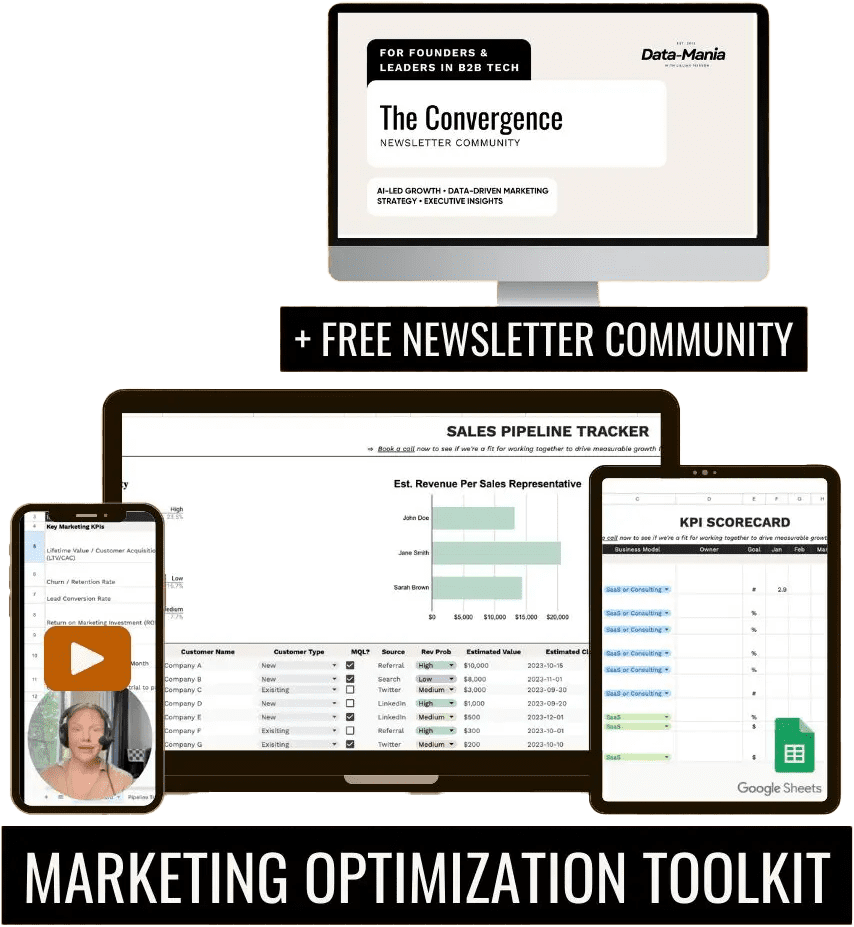Every business needs a consistent sales pipeline to grow. Effective sales pipeline management and a predictable pipeline ensures new leads are abundant so you can meet or exceed revenue targets.
However, amidst the chaos of the sales cycle, many companies overlook one of the most critical elements in sales pipeline management: data.
Data is critical in pipeline management and is present at every stage of the sales journey, from prospecting and lead generation to nurturing and closing deals. Yet, despite its undeniable importance, it has to be more actively managed so it isn’t neglected.
Today, we’ll explore data’s critical role in sales pipeline management and how effective data governance can make or break your pipeline’s performance — especially its impact on email marketing campaigns and sender reputation.

What is Data Governance?
Data governance refers to your company’s guidelines around data policies and procedures to manage its quality, security, and integrity. It also includes internal policies around collecting, storing, and disposing sensitive data.
For example, you collect personal information from lead generation forms on your website. Your data governance ensures this information is only handled by those with proper authorization and that the information is accurate and current.
Without proper data governance, your sales pipeline can quickly become cluttered with inaccurate information, leading to missed opportunities, wasted resources, and strained customer relationships.
We can categorize data governance into five main pillars:
- Ownership: Who is responsible for data within the organization, and who can make decisions about data-related matters?
- Quality: How do you maintain data quality, and what standards are in place to ensure accuracy and reliability?
- Access: Who can access and modify data, and what permissions do you grant to individuals or departments?
- Security: What measures are in place to protect sensitive data from breaches or unauthorized access?
- Lifecycle: How is data created, stored, used, and eventually retired or archived?
The Link Between Data and Sales Pipeline Management
As with most things, being proactive is always more efficient than reacting. Imagine navigating the busy streets of rush hour New York traffic (isn’t it always rush hour in NY?) for the first time without a GPS. Every wrong turn is a minute wasted and a dollar in the curse jar.
A GPS with up-to-the-minute accurate information would save time and frustration.
However, being proactive in sales is only beneficial when operating with correct data. In the sales world, your pipeline is like the GPS for your sales teams. It guides them through a network of leads, prospects, and customers and helps them navigate the journey from the first contact with a new prospect to a closed deal.
A sales pipeline is a visual representation of your sales process, consisting of various stages that reflect the customer’s buying journey.
These stages typically include the following:
- Lead generation: Data collected with each new lead is the foundation of your sales pipeline. It needs to be accurate.
- Lead qualification: Sales teams rely on data to determine which leads are genuinely interested and have the potential to become paying customers. They use data points like lead source, demographics, engagement history, and past interactions to make informed decisions.
- Nurturing: Automation tools and customer relationship management (CRM) systems leverage data to send targeted emails, personalized content, and follow-up reminders.
- Sales Analytics: Data is analyzed and interpreted to make informed decisions. These insights guide strategic decisions, such as adjusting sales tactics, optimizing marketing campaigns, or reallocating resources.
- Closing Deals: Sales is a cyclical process and doesn’t end at a closed deal. Post-sale data, including customer feedback and usage patterns, can inform customer retention strategies, upselling opportunities, and product improvements.
In the end, clean and reliable data makes it easier to see how you can improve the outcomes of your sales pipeline. It’s the key to avoiding missed opportunities and stunted growth.
Five Steps to Implement Effective Data Governance
Implementing effective data governance in sales pipeline management requires a holistic approach that involves people, processes, and technology.
Here are the key steps to ensure your data governance practices are healthy and sustainable:
1. Identify who is responsible for data governance
Managing data effectively is a team effort. It requires sales and marketing teams, IT, and data management teams to come together and adopt a data-centric culture. These teams play a valuable role in understanding the significance of data in the sales pipeline context and how it actively contributes to its integrity and quality.
Each team brings its unique perspective and expertise, ensuring the development of data governance is well-rounded, covers all relevant aspects of data management, and supports your organization’s overall mission and goals.
2. Establish clear policies and procedures
Once you identify your team, the next step is to establish clear and concise data governance policies and procedures. These documents should outline data collection, storage, sharing, and usage standards in plain language that everyone in your company can understand. The more straightforward your documents, the less room you leave for misunderstandings or misinterpretations.
3. Ensure data quality through cleansing and validation
Data can get old fast. And considering your sales team relies on this data to make sales, it must be current. Regular data maintenance is necessary to check for errors and inconsistencies, such as email format validation, to help keep your database accurate and reliable.
This consistent data maintenance, in turn, helps your sales team work more efficiently and effectively, leading to better results in your sales pipeline. So, it’s a critical step in maintaining the integrity of your data within the sales process.
4. Monitor and audit data regularly for accuracy
Data governance continues after the implementation of policies. It requires continuous monitoring and auditing. Regular data audits are necessary to help identify issues, such as outdated records or security vulnerabilities, so you can act quickly to fix them. Monitoring data usage patterns can also uncover potential areas for improvement or areas where additional training is needed.
5. Train employees to ensure compliance
Frontline employees are typically the ones using the data most often. This consistency of use means their understanding of data governance policies is critical. However, without the proper training, they may not understand their responsibilities regarding data handling.
For this reason, your company should have a comprehensive training program and accessible resources for all employees, especially those who may not have in-depth knowledge of tech.
Training should cover data security best practices, the importance of accurate data entry, and non-compliance consequences. Regular training refreshers and resources like manuals or online guides are invaluable to help reinforce these principles.
Data Governance and Email Marketing
Email marketing campaigns are an inherent part of any digital marketing strategy. Your sales pipeline is incomplete without one. Email marketing allows you to engage with your audience, nurture leads, and turn them into clients or customers.
However, the effectiveness of email marketing heavily relies on your company’s sender reputation.
What exactly is email sender reputation?
It’s the credibility of a sender’s IP address and domain. Internet Service Providers (ISPs) use the sender’s reputation to decide whether to deliver an email to a recipient’s inbox or divert it to the spam folder. As you can imagine, a positive sender reputation is vital for email deliverability and open rates. With a good reputation, there’s a greater chance your marketing emails will reach the intended recipients and they’ll open and engage with them.
Effective data governance practices directly influence the sender’s reputation. Clean, accurate, and permission-based email lists, a product of stringent data governance policies, result in lower bounce rates and spam complaints. Only sending marketing emails to people who opted in to receive them helps maintain a positive sender reputation.
This balance is where buying email lists can hurt your business. If someone receives an email from a company they’ve never heard of, there’s a greater likelihood they’ll hit the spam button. And the more spam complaints you receive, the more you risk getting banned from using email marketing services (EMS).
Additionally, data governance helps segment email lists based on recipient behavior and preferences. This segmentation allows for targeted and relevant email content, boosting engagement and sender reputation.
Here are a few tips to help you maintain a strong sender reputation:
- Use permission-based lists: Always obtain explicit consent before adding someone to your email list.
- Clean your list often: Regularly remove inactive or bounced email addresses from your list to maintain its quality.
- Send engaging content: Craft engaging and relevant content that encourages subscribers to open and interact with your emails.
- Follow a consistent sending schedule: Whether you send emails once a week or monthly, maintain a consistent sending schedule and volume to build trust with ISPs.
- Monitoring and analysis: Analyze bounce rates and spam complaints and adjust strategies accordingly.
Integrating these email marketing best practices into your data governance strategy will enhance your sender reputation and increase the effectiveness of your email marketing campaigns.
Embrace data governance
A predictable and efficient sales pipeline is your closest guarantee to a continuous flow of leads. It enables your sales teams to convert new customers and clients to meet revenue targets consistently.
For this reason, it’s essential to understand the role of data in effective sales pipeline management. Embracing data governance ensures that your sales team’s information is accurate, reliable, and up-to-date. From lead generation to closing deals, every stage of the sales process relies on clean and precise data.
Effective data governance strengthens your sales pipeline management. From identifying responsible collaborators, establishing clear policies, ensuring data quality, and providing training, your business can use data to develop a successful sales pipeline and grow your business.

Bio:
Amy Remark is a versatile copywriter with seven years experience in conversion-driven content. Lately, she’s honed her skills in writing about SaaS and financial products. Having run her own ecommerce venture (and her own copywriting business), Amy is familiar with the ins, outs, struggles, and praises of founder life. Curious and solution-oriented, she aligns herself with value-driven projects, combining her degree in Human Kinetics and digital marketing savvy to create valuable, narrative-forward prose.




